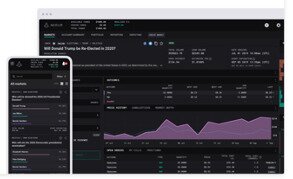What are Dapps?
dApps are decentralized applications. Facebook, Google, Twitter, and YouTube are all centralized applications. This is because at the end of the day, they control the entire platform. They can remove content, change policy, and single handedly effect the direction of the platform. There is a time and a place for centralized applications, just like there is a time and place for dApps.
dApps are able to inherit one or more of the features of blockchain. Censorship resistance, near 100% uptime, and easy monetization are all things that are easily implemented into dApps. The range of use cases for dApps is quite broad let’s break down the ‘essential features’ of a dApp, and then give some examples of cool things dApps are doing right now.
- DecentralizationGlobal Network – no downtime, access anywhere, zero censorship.
Open Network – most dApps run on networks like Ethereum. Anyone can join, and contribute to the network, increasing its overall strength and viability. - Easy Transactions
Secure information sharing – share anything, with anyone. This allows users to monetize their own data to marketing companies, or control who has access to their preferences.
Asset transfer – dApps are naturally connected to blockchains which have their own built-in currency. This makes creating and transferring units of value extremely simple. - Autonomy
dApps run almost entirely on their own. This makes building a dApp relatively cheap to build and scale from a business perspective. The infrastructure is provided by the underlying blockchain network. This allows companies to focus more on user engagement, and less on the technical details of deploying an application. - Interoperability
dApps that are built on the same platform are able to talk with one another seamlessly. This is a great feature, because all of a sudden, the actions I take on one dApp may have an effect on another. Companies spend millions of dollars building this functionality from scratch. dApps built on the same blockchain are able to talk to each other by default.
What is the Point of dApps?
On the surface dApps right now are pretty straight forward, you can do normal things like play card games, breed virtual cats (cryptokitties), gamble, or even hire freelancers (ethlance). But the point of dApps is really to do what normal applications can’t with centralized control and imperfect communication. The industry has jut but scratched the surface of what is possible with dApps. Use cases are still being explored, however we definitely have examples of very cool concepts.
Some Examples of dApps
Decentraland
Decentraland is a 3D virtual realm that runs on the Ethereum blockchain. Users can create avatars by connecting an Ethereum wallet. They then enter into a realm where they can buy and own virtual plots of land and purchase goods and services using MANA, Decentraland’s currency. Decentraland is its own virtual world, complete with its own decentralized virtual economy.
Augur
Augur is a peer to peer betting platform that lets users bet on anything. Yes, literally anything. Will it rain tomorrow in New York? Will Trump get re-elected? Will this recession be greater than 1987? Users can buy the outcome that they believe is most likely, priced between 0-100 (which represents % probability). Get in early enough on the right side, and you will ride it all the way up to 100. This model is great for gamblers, but even greater for the gauging of public opinion. By creating an incentive for people to vote what they believe is the most likely outcome, Augur can essentially collect reliable market data on anything.
IDEX
One of the more popular and well known dApps, IDEX is an entirely decentralized exchange. This means that buyers and sellers interact directly each other using their wallets. The main benefit decentralized exchanges is that you get to keep ahold of your keys while you trade cryptocurrency. Typically, you will deposit your funds onto a centralized exchange, giving up your access.
Aragon
Aragon is a platform for creating Decentralized Autonomous Organizations (DAOs). This is arguably the most impactful and ambitious possibility of dApps. DAOs enable organizations to be governed entirely by users. Through collective voting, users can submit decisions or changes they would like to see in the organization. Everybody with the DAO’s token can vote on the decision. This allows organizations to operate without any central party, and be governed like a co-operative, except with the efficiency, security, and diversity of blockchain technology.
Frequently Asked Questions About dApps
No but Ethereum was the first blockchain of its kind to be built specifically for developers to easily build and run dApps on its platform. Second generation “world-computers” such as Ethereum, Tron and EOS are all capable of running dApps. Ethereum is multifunctional, as it can supports many different kind of dApps. Technically, bitcoin is a dApp that has two features; Money Transfer and Messaging. So while Ethereum didn’t invent dApps, it did bring a lot of attention and development to the space.
Cryptocurrency enthusiasts are really excited about potential dApps. This is because dApps have world changing implications. Most dApps have their own unique token integrated into the dApplication. This is exciting because it gives crypto enthusiasts additional opportunity to participate in the dApp community. Some crypto enthusiasts are pretty harsh on dApps, as there are many dApps that have been identified as being outright scams. This has brought a healthy amount of skepticism to crypto enthusiasts when interacting with dApps.
dApps are most often used through their own websites or mobile app. For most you will need an Ethereum wallet, we recommend creating one using MetaMask. Then you are able to connect to the dApps. By connecting your wallet, this ensures all information you create, use, and transfer on the dApp is associated with and accessible only by your wallet.
Find dApps here: https://ethereum.org/dapps/
And a full list: https://www.stateofthedapps.com/
Yes, although indirectly. As of yet, you cannot actually invest in a dApp like you could in a company where you buy legal shares in it. However, most dApps use their own tokens to run the various operations of the dApp, and these tokens can be bought.
In theory dApps will do to blockchain and the internet what Microsoft Windows did to the internet. It will make the security, privacy, and decentralized features of blockchain widely accessible for the everyday user by bringing use cases right to their front step. dApps will make the worlds of finance and investment management, social media and content sharing, democracy and governance radically more transparent, accessible to all, and collectively beneficial. Examples that are seen above are already impacting these industries. Soon enough, centralized corporations and governments will no longer be the gatekeepers – we will be.




